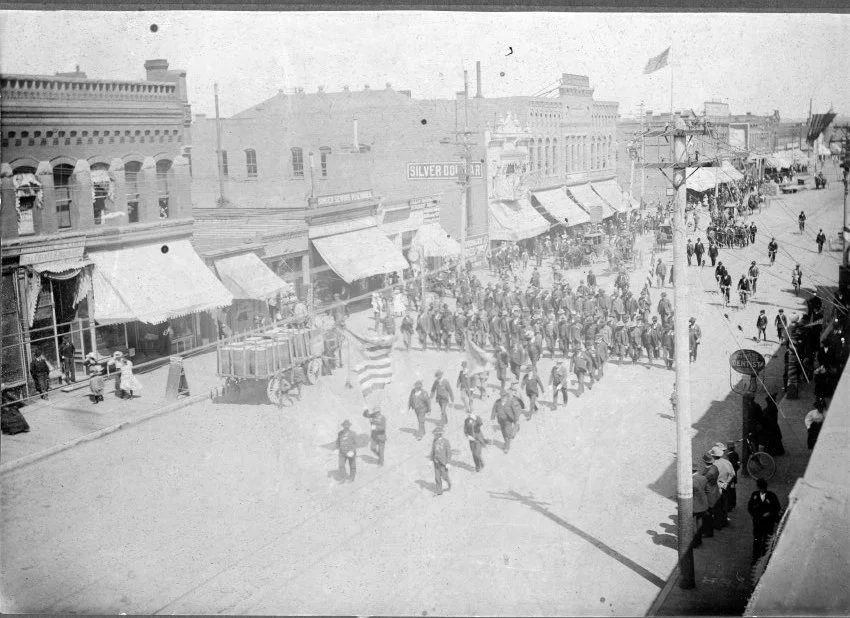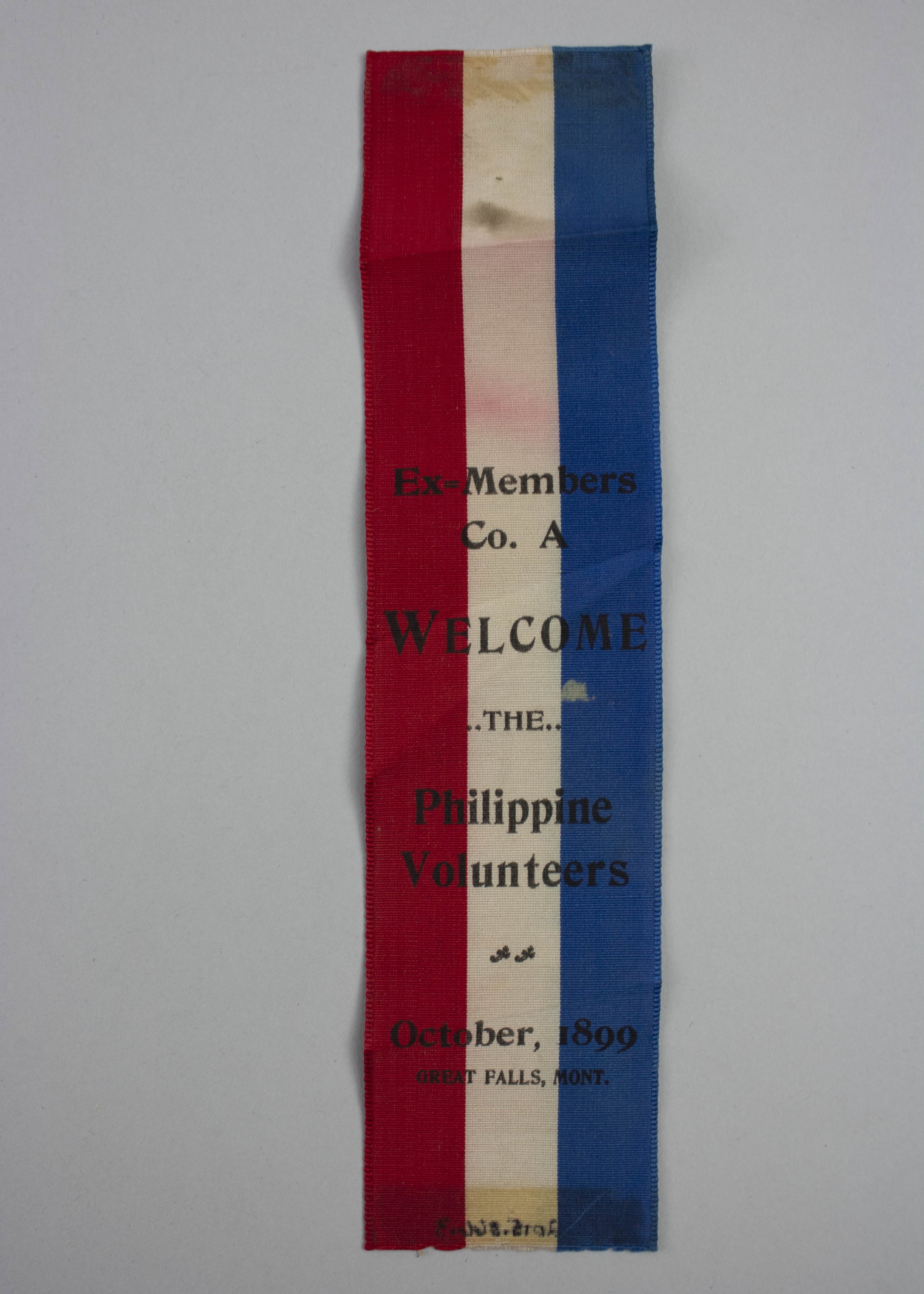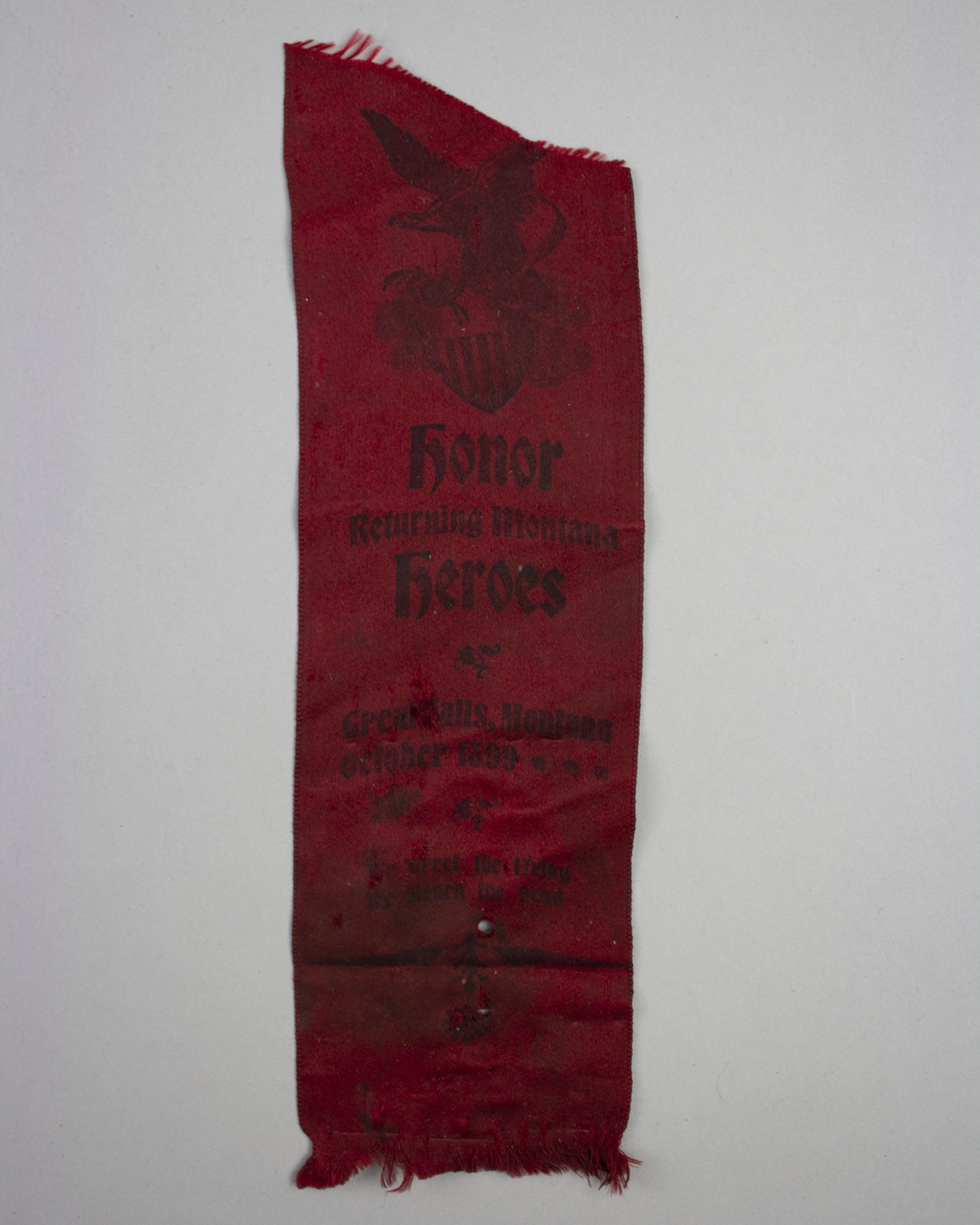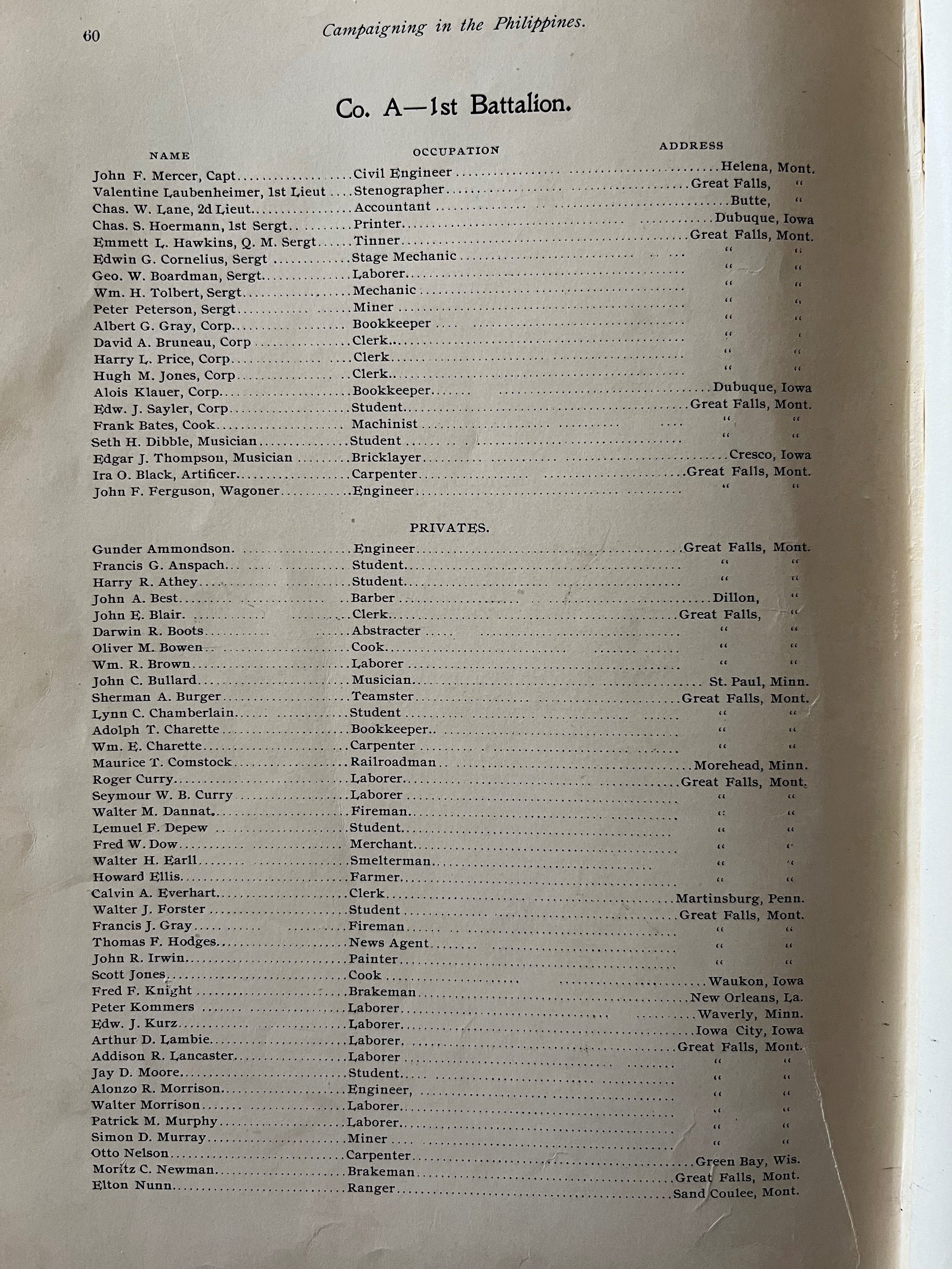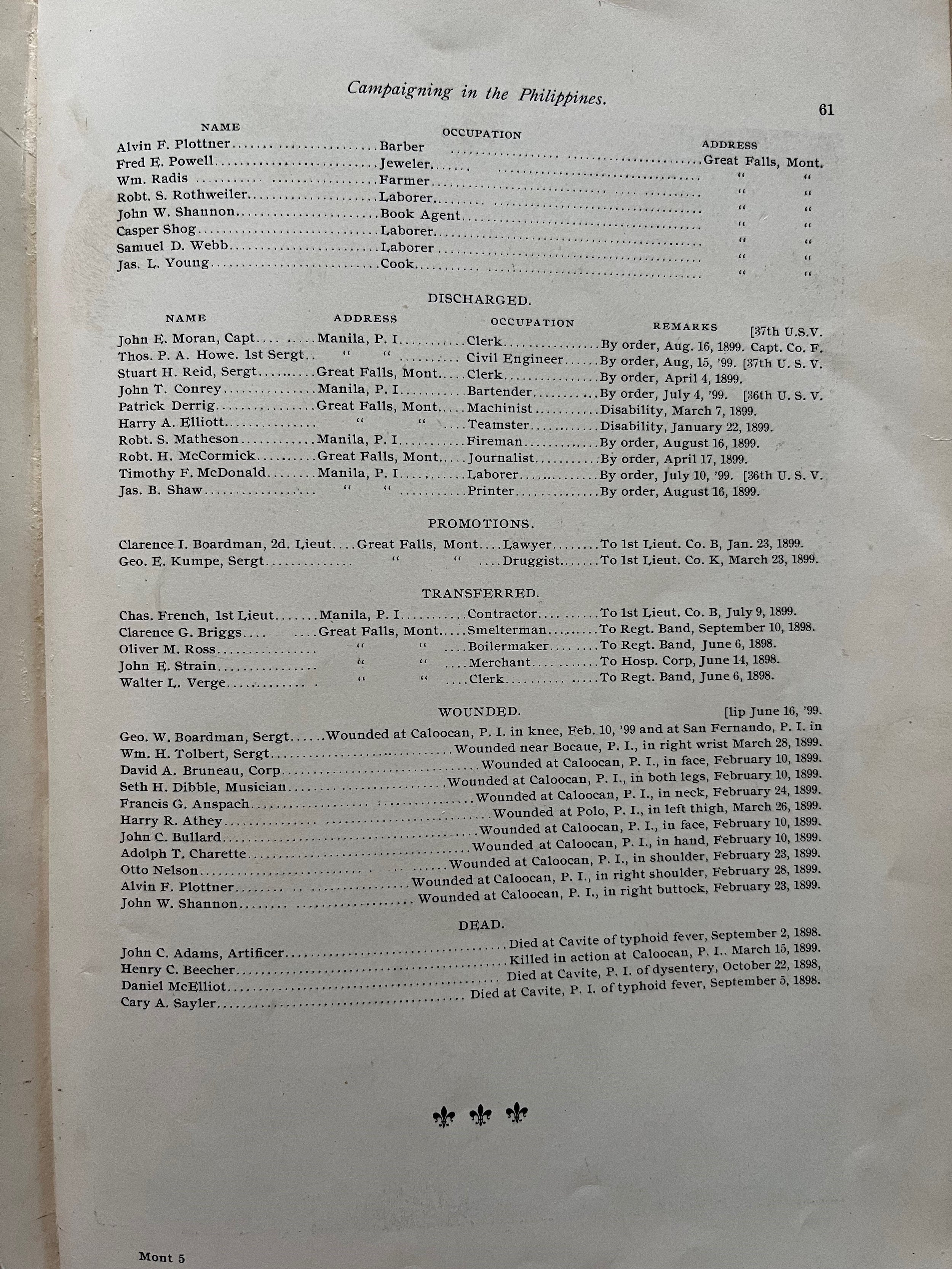Charles French & Company A of the 1st Montana in the Philippines
Charles French came to Great Falls in 1888. He had been in the Dakota National Guard before coming to Montana and when Co. A of the Montana National Guard was organized in 1889, he was one of the first to enroll his name. The Great Falls Company was lovingly dubbed the “Gibson Light Guards.” French was noted for his proficiency and superior military knowledge as well as being a sharpshooter.
It began with the U.S.S. Maine; the match that lit the light of war for the United States. On April 25, 1898, America declared war on Spain.
Company A marching to the train station in Great Falls [CCHS 001.0001]
Company A marching to the train station in Great Falls [CCHS 001.0003]
Company A marching to the train station in Great Falls [CCHS 001.0004]
On May 5, 1898, the Montana National Guard was called to service. The group gathered their equipment, said their goodbyes and got on the train to Helena. 500 soldiers were requested from Montana and the guard and volunteers answered overwhelmingly by providing almost three times that much. On May 8, Co. A was mustered into service and began running drills with the rest of the Montana units. There was an extreme lack of uniforms and weapons but that was set to be remedied when they moved to San Francisco on May 25.
[2018.068.0005]
On May 28, they arrived in California and joined rest of the U. S. units awaiting their ride to the Philippines. The steamboat Pennsylvania was their transport leaving for Manila on July 19. As they were on their way, on August 13, the Spanish surrendered. But now the Philippines was open for conquest and the Filipinos knew it. The Montanan’s arrived on August 24 and began their struggle with the elements.
“Inadequate ocean transportation necessitated frightfully overcrowded conditions on board ships from San Francisco to Manila. Anything like barracks on the islands was entirely absent, and when the men arrived at Cavite, they were literally dumped out to do the best they could in the way of shelter from the hot sun and torrential drains. That they withstood the sudden attacks of malaria and the hardships of campaigning in the hot country cheerfully, speaks volumes for their physical condition when they left Montana.”
Great Falls Tribune May 6, 1923
Though the Spanish had surrendered, the Filipinos did not want a new overlord. December 10, the United States paid $20 million to annex the Philippines. The Filipinos would not take this lying down.
1st LT. French upon arrival in Manila, was transferred to Co. B from Butte and often acted as their Company Commander. He wrote home often and sending little trinkets to his brother Samuel. He longed for news from home and asked for more letters in the following letter to his mother:
Manila P.I. Jan 31, 1899
Dear Mother, I will write and let you know that I am as well as usual. The mail leaves tomorrow and I will not write much as it is quite late now. I received a letter from father dated Dec 1st with one from Minnie enclosed which I will answer by this mail if I have time. I don’t understand why I have not received any letters since as others have received letters from Great Falls that were mailed as late as Dec 25. I think you ought to write me oftener than once a month. I got one from Sam dated Dec 13th but none since. The mail has come in twice lately without brining me a letter. All of the members of Co. A are well. McCormack is still at Corregidor in back, but he is the only one that has been on the sick report for several days. I am still in command of Co B and will probably remain so until we are ordered home which may be within a month or two. It keeps me busy most of the time. I will be glad when I get back with Co A again although I get along with Co B first rate. But a company commander has a great deal of responsibility resting on him and in my case all I get out of it is $25.00 a month extra. It has been fine weather here for the last two months. The days are hot, but the nights are cool. That is, they are cool for this country. I suppose we would think them hot in Montana, but we are accustomed to the heat now and when it gets down to about 70, we think it is quite cold. I like it here but would not like to have to work for a living in this country. It will be hard for me to get down to real hard work again when I get back, but I will have to do it. I suppose well I must close for the time. Tell father to write often you don’t know what a disappointment it is to have the mail come in and not bring any letters from home.
Charles French [CCHS 054.79]
It’s doubtful that his mother got to read this letter, as she died February 4, four days after it was written.
Tension between the Americans and the Islanders broke that same day and the Philippine fight for independence began. This was far harder than the fight with the Spanish. 1st LT. French distinguished himself in command of Company B throughout the campaign and was in all the battles of that campaign in which the Montana Regiment took a part. After 140 days on the front lines, the Montana volunteers were relieved and returned to Manila on June 28. As they all prepared to go home, 55 men chose to reenlist and stay for another tour of duty. Charles French was one of them.
Certificate appointing Charles French, Captain in the Thirty-sixth regiment of the Infantry, U.S. Volunteers, July 5, 1899 [2000.081.0003]
French was promoted to Captain and put with the 36th Infantry on July 21. On October 30, 1899, he was mortally wounded while heading a reconnoitering party advancing on Florida Blanca, North Luzon. He died the next day from shock as a result of amputation of the leg below the knee. He left behind his brother and father in Great Falls, as well as many numerous friends and comrades.
“With no thought of his own deed, his constant endeavor was only to ameliorate suffering and to cheer the depressed. Never shirking his duty, he went where dangers were greatest and set the example that prompted his men to forget the present discomfort and follow to certain victory.”
Great Falls Tribune December 16, 1899
Great Falls Tribune May 6, 1923
In the cold of winter, the city laid Charles to rest in Highland Cemetery. As the procession went down Central Ave, businesses closed their doors and paid their respects as the casket passed. Once at the cemetery and the service done, three volleys were fired over the grave, and a good man and a brave soldier was left in his last resting place.
The Philippine-American war was considered over in November of 1899 with the capture of Emilio Aguinaldo, the leader of the Filipino insurrection, though guerrilla style ambushes and attacks continued for years after.
One of two Spanish American War Veteran's ceremonial flags with inscription “Captain Charles French Camp No. 4, Great Falls Montana.” [1985.101.1]
Above: Red, white, and blue striped ribbon: Ex-Members Co. A Welcome the Philippine Volunteers, October, 1899, Great Falls, MT. [2015.066.3]
Red ribbon: Honor Returning Montana Heroes at Great Falls, Montana, October, 1899 [2008.092.26]
Charles French’s influence was carried on by the Great Falls branch of the United Spanish War Veterans who named their camp after him.
Company A too held onto their ties after returning finally to Great Falls on October 24, 1899, having reunions and creating the Last Man’s Club in 1941. Mr. Seymour Curry was the last man, passing on November 9, 1967.
Veterans of 1st Montana Infantry of Spanish American War in reunion. [2007.017.0804d]
Great Falls Tribune October 24, 1899 [2015.066.0003]
Above: Insert and pg. 60, 61 from “Campaigning in the Philippines by Karl Irving Faust


